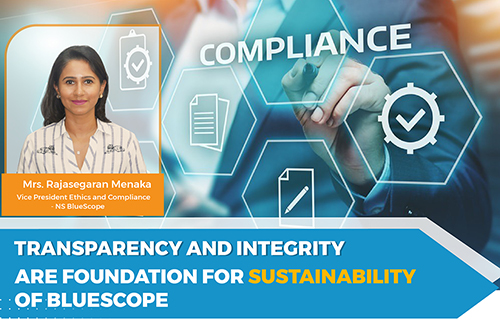
Most of companies see a “culture of compliance”, especially the “transparency and integrity”, as an important, yet elusive, difficult to define, and even more challenging term to form and nurture. However, it is clear that a culture of compliance lays the foundation of behavior, integrity, and accountability in an organization. This will promote the trust and confidence of employees and customers. How could the management regconise the importance of the compliance culture and make such culture to be more effective? Ms. Rajasegaran Menaka – Vice President Ethics and Compliance of NS BlueScope, with more than 20 years professional experience, shared with us how NS BlueScope has been promoting the compliance culture to enhance the transparency and integrity in the business and sustainability of the company.
1. Can you share why and how BlueScope promote doing business with transparency and integrity?

As a leading steel company, BlueScope Steel is judged not only by the profits we make and the products we deliver, but by the way we act. In the words of our Bond, ‘Our strength is choosing to do what is right’. Our Bond is the expression of the values of BlueScope, and the way the Company and its employees should conduct business. It also forms the basis of BlueScope’s policies, standards and guidelines. Our detailed business policies and guidelines apply to all employees.
We also have BlueScope’s Guide to Business conduct which is available externally and all third parties who deal with BlueScope are expected to comply with the expectations set out in the document. As we evolve with the times, so will this document and BlueScope will be issuing an updated version of the document at the end of 2020.
In BlueScope all employees play an important role in ensuring that BlueScope acts with integrity and
practices BlueScope’s Speak Up culture – In this, we encourage both our employees and anyone we work with to speak up if they see something that they do not think is right and refer to the details on our website. We are committed to fostering a culture of speaking up when something isn’t right, and to protecting those who raise genuine concerns. This allows us to improve how we work, identify any issues quickly and address those issues.
2. What is the biggest challenge for a corporation in promoting this culture?

For decades, leaders were expected to focus on one thing: financial results. But we are now in the midst of an ethical revolution. Leaders are increasingly held accountable for poor behavior, and companies are pushed by employees, governments, and customers to step up and adopt a multi-stakeholder approach that serves social purposes as well as investor demands.
Leadership must openly and directly embrace integrity. The CEO and others on the leadership team are powerful role models who set the company’s ethical tone. If they cut corners, don’t follow the rules, or ignore bad behavior by top performers, it gives everyone implicit permission to act the same way. Leaders must openly and directly talk about integrity, embrace it as part of the culture, and be ready to do the “right thing,” even if it appears to hurt business in the short run.


Integrity is a sharp double-edged sword for companies today. Lapses can spark employee rebellion, customer blowback, and government investigations. But handled correctly, integrity can be a uperpower that inspires employees and resonates with today’s values-minded consumers. And integrity is ontagious. By creating an environment in which it is openly embraced by leadership and woven into the fabric of our culture, it becomes a powerful asset.
3. What are the benefits for a corporation if they promote transparency and integrity while doing their business?

4. Could you share a successful story of an organization/country that pursued transparency and integrity as a direction to grow?
Over the past five decades, Singapore has made good use of its physical and environmental resources to achieve its national outcomes of having a competitive economy, sustainable environment and high quality of life. Singapore’s success relies on various factors, one of which is to have an effective public bureaucracy and effective control of corruption. In addition, it is also contributed by other factors such as:
- The pragmatic leadership of the late Lee Kuan Yew and
his successors; - Strategy to make investment in education and competitive
compensation to have the “best and brightest” citizens through; and - Learning from other countries.





Comment